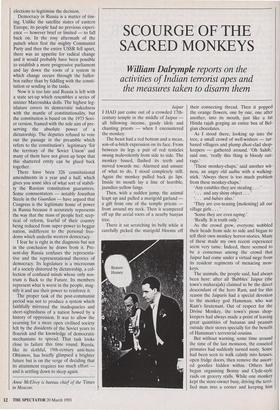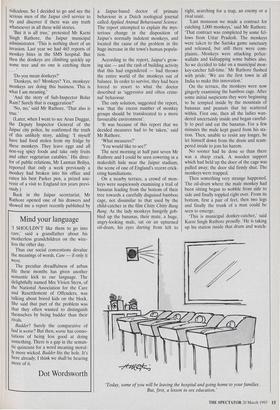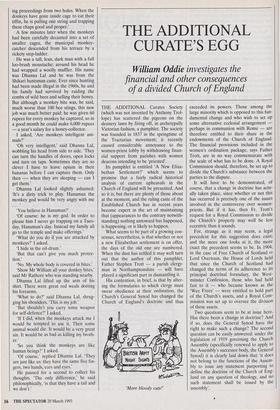SCOURGE OF THE SACRED MONKEYS
William Dalrymple reports on the
activities of Indian terrorist apes and the measures taken to disarm them
Jaipur I HAD just come out of a crowded 17th- century temple in the middle of Jaipur all billowing incense, gaudy idols and chanting priests — when I encountered the monkey.
The beast had a red bottom and a mean, son-of-a-bitch expression on its face. From between its legs a pair of red testicles swung malevolently from side to side. The monkey hissed, flashed its teeth and moved towards me. Alarmed and unsure of what to do, I stood completely still. Again the monkey pulled back its lips. Inside its mouth lay a line of horrible, jaundice-yellow fangs.
Then, with a sudden jump, the animal leapt up and pulled a marigold garland a gift from one of the temple priests from around my neck. Then it scampered off up the aerial roots of a nearby banyan tree.
There it sat scratching its belly while it carefully picked the marigold blooms off their connecting thread. Then it popped the orange flowers, one by one, one after another, into its mouth, just like a fat Hindu rajah gorging an entire box of Bel- gian chocolates.
As I stood there, looking up into the tree, a small crowd of well-wishers — tur- baned villagers and plump dhoti-clad shop- keepers — gathered around. 'Oh Sahib,' said one, 'really this thing is bloody out- rage.'
`These monkey-chaps,' said another wit- ness, an angry old sadhu with a walking- stick. 'Always there is too much problem from these monkey-chaps.'
`Any eatables they are stealing . . . '
. and any shiny object . . . '
. . and babies also.'
`They are eve-teasing [molesting] all our village girls ... '
`Some they are even raping.'
`Really. It is truth only.'
As the crowd grew, everyone wobbled their heads from side to side and began to tell their own monkey horror-stories. Many of these made my own recent experience seem very tame. Indeed, there seemed to be a consensus among the crowd that Jaipur had come under a virtual siege from its resident regiments of menacing mon- keys.
The animals, the people said, had always been here: after all 'Bubbles' Jaipur (the town's maharajah) claimed to be the direct descendant of the hero Ram, and for this reason the Jaipuris had a special devotion to the monkey god Hanuman, who was Ram's lieutenant. Out of respect for the Divine Monkey, the town's pious shop- keepers had always made a point of leaving great quantities of bananas and peanuts outside their stores specially for the benefit of Hanurn an's terrestrial cousins.
But without warning, some time around the time of the last monsoon, the cosseted primates had suddenly turned nasty. Some had been seen to walk calmly into houses, open fridge doors, then remove the assort- ed goodies hidden within. Others had begun organising Bonny and Clyde-style raids on grocery stalls. While one monkey kept the store-owner busy, driving the terri- fied man into a corner and keeping him there with bared fangs, the accomplices would raid the fruit baskets at the front of the shop and make off with whatever they wanted.
More bizarre still were the reports of a single monkey assassin who had begun ran- domly attacking the town's policemen. The monkey was said to drop suddenly out of a tree and dig its fangs into an unsuspecting policeman's leg; no fewer than 12 consta- bles had reported drop-and-run attacks of this sort.
The most celebrated story of all, howev- er, was one well-attested case of a monkey hotly pursuing an elderly policeman named Sub-Inspector Solar Ram. Sub-Inspector Ram happened to be on a motorbike when the monkey jumped down from its place of ambush. Initially frustrated by the accelera- tion of the Sub-Inspector's vespa, the mon- key nevertheless chased the elderly policeman through the alleys of the old city, before eventually catching up with him at a traffic-light. There the animal had bit- ten a small lump out of one of the Sub Inspector's buttocks before disappearing into a tree. From there it threw down a rain of sticks at the crowd who had gath- ered below.
Eventually, two bus-loads of police had arrived on the scene with strict instructions to cordon off the area and capture the offending monkey alive: because of the town's association with Hanuman, the Jaipur Inspector General of Police had not dared to order the monkey's shooting, however psychopathic it was becoming. Yet despite all the assembled policemen and the extravagant security arrangements, the monkey had still managed to jump from treetop to treetop, from vine to vine, Tarzan fashion, and so given the law the slip.
It was all beginning to sound a little ridiculous. So I decided to go and see the serious men of the Jaipur civil service to try and discover if there was any truth whatsoever in all these wild stories.
`But it is all true,' protested Mr Karni Singh Rathore, the Jaipur municipal administrator. 'This is nothing short of an invasion. Last year we had 465 reports of monkey bites in the SMS hospital. But then the donkeys are climbing quickly up some tree and no one is catching them 'Do you mean donkeys?'
`Donkeys, no? Monkeys? Yes, monkeys: monkeys are doing this business. This is what I am meaning.'
`And the story of Sub-Inspector Bolar Ram? Surely that is exaggeration?'
'No, no,' said Mr Rathore. 'That also is true.'
(Later, when I went to see Arun Duggar, the Deputy Inspector General of the Jaipur city police, he confirmed the truth of this unlikely story, adding: 'I myself have had food stolen from my fridge by these monkeys. They leave eggs and all non-veg spicy foods and take only fruits and other vegetarian eatables.' His direc- tor of public relations, Mr Laxman Boliya, reported that only a week previously a monkey had broken into his office and eaten his best Parker pen, a prized sou- venir of a visit to England ten years previ- ously.) Back in the Jaipur secretariat, Mr Rathore opened one of his drawers and showed me a report recently published by
a Jaipur-based doctor of primate behaviour in a Dutch zoological journal called Applied Animal Behavioural Science. The report attempted to explain the mys- terious change in the disposition of Jaipur's normally indolent monkeys, and located the cause of the problem in the huge increase in the town's human popula- tion.
According to the report, Jaipur's grow- ing size — and the rash of building activity that this had engendered — had thrown the entire world of the monkeys out of balance. In order to survive, they had been forced to resort to what the doctor described as 'aggressive and often crimi- nal' behaviour.
The only solution, suggested the report, was 'that the excess number of monkey groups should be translocated to a more favourable environment'.
'It was because of this report that we decided measures had to be taken,' said Mr Rathore.
'What measures?'
'You would like to see?'
The next morning at half past seven Mr Rathore and I could be seen cowering in a makeshift hide near the Jaipur stadium, the scene of one of England's recent crick- eting humiliations.
On a nearby terrace, a crowd of mon- keys were suspiciously examining a trail of bananas leading from the bottom of their tree towards a carefully disguised bamboo cage, not dissimilar to that used by the child-catcher in the film Chitty Chitty Bang Bang. As the lady monkeys hungrily gob- bled up the bananas, their mate, a huge, angry-looking male, sat on an upturned oil-drum, his eyes darting from left to
right, searching for a trap, an enemy or a rival male.
'Last monsoon we made a contract for catching 1,000 monkeys,' said Mr Rathore. `That contract was completed by some fel- lows from Uttar Pradesh. The monkeys were taken to the Sariska game sanctuary and released, but still there were com- plaints. Monkeys were attacking police- wallahs and kidnapping some babies also. So we decided to take on a municipal mon- key-catcher full-time.' Mr Rathore flushed with pride: 'We are the first town in all India to make this innovation.'
On the terrace, the monkeys were now gingerly examining the bamboo cage. After some initial suspicions they were beginning to be tempted inside by the mountain of bananas and peanuts that lay scattered within. First one, then all the ladies wan- dered uncertainly inside and began careful- ly to peel and eat the bananas. For a few minutes the male kept guard from his sta- tion. Then, unable to resist any longer, he let himself down from the drum and scam- pered inside to join his harem.
No sooner had he done so than there was a sharp crack. A wooden support which had held up the door of the cage was pulled away; the door slid firmly shut. The monkeys were trapped.
Then something very strange happened. The oil-drum where the male monkey had been sitting began to wobble from side to side and finally toppled right over. From its bottom, first a pair of feet, then two legs and finally the trunk of a man could be seen to emerge. 'This is municipal donkey-catcher,' said Karni Singh Rathore proudly. 'He is taking up his station inside that drum and watch- 'Today, some of you will be leaving the hospital and going home to your families. But, first, a lesson in sex education.' ing proceedings from two holes. When the donkeys have gone inside cage to eat their tiffin, he is pulling one string and trapping these chaps good and proper.'
A few minutes later when the monkeys had been carefully decanted into a set of smaller cages, the municipal monkey- catcher descended from his terrace by a rickety step-ladder.
He was a tall, lean, dark man with a full loo-brush moustache; around his head he had wrapped a woolly muffler. His name was Dhanna Lal and he was from the Shikari huntsman caste. Ever since hunting had been made illegal in the 1960s, he and his family had survived by raiding the combs of wild bees and selling their honey. But although a monkey bite was, he said, much worse than 100 bee stings, this new job was much better paid: he was given 60 rupees for every monkey he captured, so in a good month he could make 6,000 rupees — a year's salary for a honey-collector.
I asked, 'Are monkeys intelligent ani- mals?'
`Oh very intelligent,' said Dhanna Lal, wobbling his head from side to side. 'They can turn the handles of doors, open locks and turn on taps. Sometimes they are so clever I have to leave opium in their bananas before I can capture them. Only then — when they are sleeping — can I get them.'
Dhanna Lal looked slightly ashamed: `It's a dirty trick to play. Hanuman the monkey god would be very angry with me `You believe in Hanuman?'
`Of course: he is my god. In order to please him I never go trapping on a Tues- day, Hanuman's day. Instead my family all go to the temple and make offerings.'
`What do you do if you are attacked by monkeys?' I asked.
`I hide in the oil-drum.'
`But that can't give you much protec- tion.'
`No. My whole body is covered in bites.'
`Show Mr William all your donkey bites,' said Mr Rathore who was standing nearby.
Dhanna Lal lifted up the arm of his shirt. There were great red weals dotting his forearms.
`What to do?' said Dhanna Lal, shrug- ging his shoulders. 'This is my job.'
`But shouldn't you carry some weapon for self-defence?' I asked.
`If I did, when the monkeys attack me I would be tempted to use it. Then some animal would die. It would be a very great sin. It would be as bad as killing my broth- er.'
`So you think the monkeys are like human beings?' I asked.
`Of course,' replied Dhanna Lal. 'They are just like us: they have the same five fin- gers, two hands, ears and eyes.'
He paused for a second to collect his thoughts. 'The only difference,' he said philosophically, 'is that they have a tail and we don't.'





























































 Previous page
Previous page